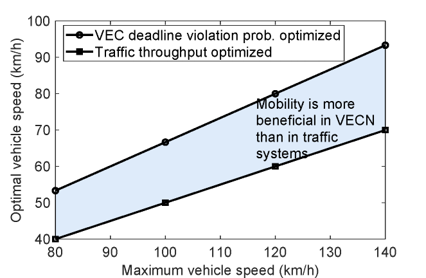Exploiting Moving Intelligence: Task Offloading in Vehicular Networks
Vehicles as Moving Edge Clouds
Future vehicles will be equipped with compute resources and be connected by wireless technologies, forming the Vehicular Edge Clouds (VEC) that enables compute resources being shared via opportunistic task offloading. Apparently, the mobility of vehicles brings both challenges and opportunities for timely task offloading. How to address and exploit the mobility to guarantee the delay and reliability in VEC?
Task Offloading in Vehicular Edge Clouds
1. Distributed Task Offloading and Replica[1]
The offloading decisions are made by task vehicles in a distributed manner. Both communication and computation delay in VEC depend on many factors and vary fast, which are complex to model and to predict. We propose offloading algorithm based on Multi-armed bandit (MAB). Task vehicles try different candidate service vehicles and learn their delay performance on the go. The proposed algorithm considers random arrivals of service vehicles and the heterogeneity of tasks, and can thus effectively adapts to the dynamic vehicular environment and converge fast to the optimal service vehicle with theoretical guarantee.To further improve the service reliability, each task replica can be offloaded to multiple service vehicles simultaneously. The offloading algorithm is designed based on combinatorial MAB. Simulations show that reliability can be improved to around 99% with a few replica, while only 95% can be achieved without replica.
2. Centralized Opportunistic Task Assignment[2]
Road-side Units (RSUs) collect tasks from pedestrians or vehicles, and opportunistically assign them to the service vehicles coming into the coverage. Tasks waiting to be executed at each RSU have hard delay bounds. The objective is to minimize the deadline violation ratio of tasks by determining which task should be allocated to which service vehicle. The problem is formulated as a Markov decision process (MDP) problem, and the optimal policy is proven to be balanced task assignment (BETA) policy, i.e., task replications should be as balanced as possible to avoid unnecessary services. We have also proven that the  optimal vehicle speed that maximizes service reliability is 2Vmax/3, where Vmax is the maximum vehicle speed. In comparison, the optimal vehicle speed maximizing the traffic throughput is Vmax/2 in road traffic theory, which reals that mobility can bring more benefits to the VEC than the road traffic.
optimal vehicle speed that maximizes service reliability is 2Vmax/3, where Vmax is the maximum vehicle speed. In comparison, the optimal vehicle speed maximizing the traffic throughput is Vmax/2 in road traffic theory, which reals that mobility can bring more benefits to the VEC than the road traffic.
[1] Y. Sun, X. Guo, S. Zhou, Z. Jiang, X. Liu, and Z. Niu, “Learning-based task offloading for vehicular cloud computing systems,” IEEE Intl. Conf. Commun. (ICC), Kansas, USA, May 2018.
[2] Z. Jiang, S. Zhou, X. Guo, and Z. Niu, “Task replication for deadline-constrained vehicular cloud computing: optimal policy, performance analysis and implications on road traffic,” IEEE Internet Things J., 5(1): 93-107, Feb. 2018.
[3] S. Zhou, Y. Sun, Z. Jiang, and Z. Niu, “Exploiting moving intelligence: delay-optimized computation offloading in vehicular Fog networks,” IEEE Commun. Mag., 2018 (submitted).

